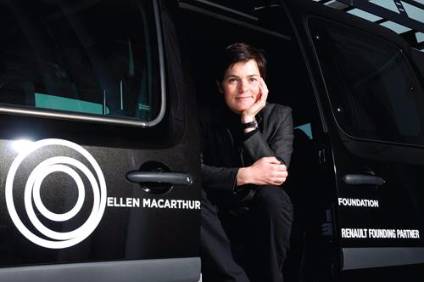
Nestlé and Danone have signed up to a new global food project launched by UK-based charity The Ellen MacArthur Foundation.
The Ellen MacArthur Foundation Food initiative will seek to “develop circular economy solutions to the problems of today’s food system”, bringing together key cities and global companies for the first time, according to a statement from the charity.

Discover B2B Marketing That Performs
Combine business intelligence and editorial excellence to reach engaged professionals across 36 leading media platforms.
The Foundation was created by the retired British sailor of the same name and works with businesses, governments and other professionals to “build a framework for an economy that is restorative and regenerative by design”. A so-called circular economy is geared toward minimising waste to reduce the impact on the planet and making the most of available resources.
A spokesperson for the charity confirmed to just-food that the newly-launched three-year project is the first to approach issues in the food system on such a wide scale. While it has previously engaged in initiatives pertaining to food, plastics and fashion, the Foundation has not looked at aspects of the food system as a whole before.
London, New York and Sao Paulo in Brazil are the cities picked to work with businesses including Japanese food company Mizkan Holdings, bio-chemistry firm Novamont, waste-management company Veolia, and chemical business Yara, as well as Nestlé and Danone.
“Food production is responsible for almost a quarter of global greenhouse gas emissions, and mismanaged fertilisation and manure exacerbate air pollution, contaminate soil and leach into water supplies,” the Foundation said in a statement announcing the project today (12 June). “These factors, and others associated with today’s food system, mean even when trying to make healthy choices, consumers are at risk.”

US Tariffs are shifting - will you react or anticipate?
Don’t let policy changes catch you off guard. Stay proactive with real-time data and expert analysis.
By GlobalDataBy joining the new initiative, Nestlé said it is aiming to play a part in promoting healthier and sustainable foods in the global food system, with eliminating waste part of that objective.
“We acknowledge the sheer size and transformative nature of the changes required and we believe a circular economy can offer sustainable alternatives to help create a more sustainable future for the global food system,” a Nestlé spokesperson told just-food.
“Nestlé has the scientific knowledge and nutrition expertise to reimagine the future of food. We aim to leverage them by rethinking what agriculture, food production and food delivery might look like in decades to come to fulfil people’s needs – essentially to provide nutritious, affordable food in a sustainable manner.”
The Ellen MacArthur Foundation Food initiative follows its report – ‘Cities and Circular Economy for Food’ unveiled at the World Economic Forum in January – and which concluded that to “meet the dietary needs of a growing global population, while restoring biodiversity and addressing the climate crisis, the food system requires fundamental redesign”.
Dr Clementine Schouteden, who is heading the new project, said the initiative provides a valuable opportunity to tackle issues affecting the plant.
“By joining forces in this way, cities, and the businesses and people in them, can transform the global food system,” Schouteden said. “We can grow food in ways that support ecosystems instead of damaging them. Food would be sourced locally, when it makes sense, and we would make the most of it, avoiding edible waste and using organic by-products to improve soil health.
“This is a unique opportunity to create a system which helps to tackle the climate crisis, restore biodiversity, improve human health, and reconnect people with their food, while creating new business opportunities.”





